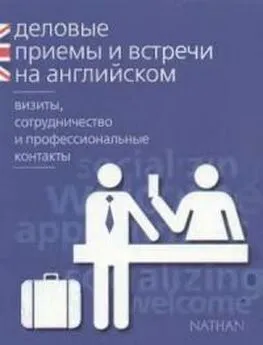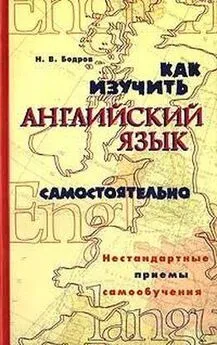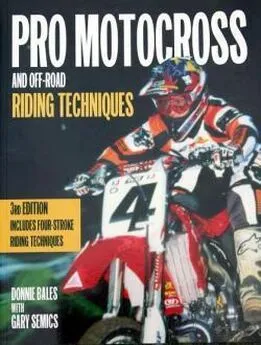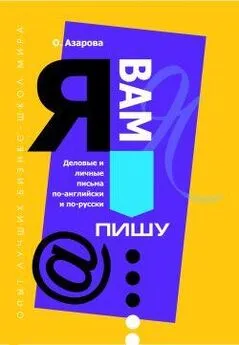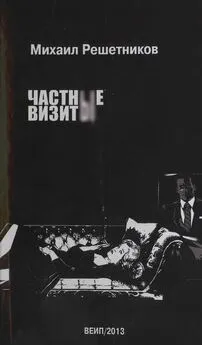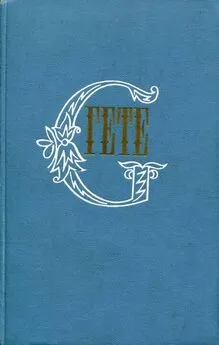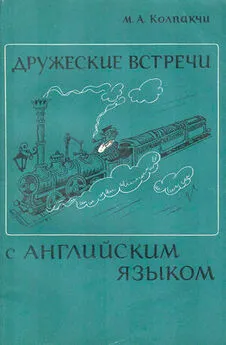Сирена Мердек-Стерн - Деловые приемы и встречи на английском: визиты, сотрудничество и профессиональные контакты
- Название:Деловые приемы и встречи на английском: визиты, сотрудничество и профессиональные контакты
- Автор:
- Жанр:
- Издательство:Астрель; АСТ
- Год:2005
- ISBN:нет данных
- Рейтинг:
- Избранное:Добавить в избранное
-
Отзывы:
-
Ваша оценка:
Сирена Мердек-Стерн - Деловые приемы и встречи на английском: визиты, сотрудничество и профессиональные контакты краткое содержание
Деловые приемы и встречи на английском: визиты, сотрудничество и профессиональные контакты - читать онлайн бесплатно полную версию (весь текст целиком)
Интервал:
Закладка:
0 Hello Rachel!
g) What’s ERP?
h) Well, the computer went down last night, and we’ve lost all our ERP data.
i) Fine, thanks, and you?
Упражнение
Formal or informal?
a) Good morning Mr Jones, how are you?
b) Hello Mary, how’s business?
c) How’s the hotel?
d) Fine, thanks, and you?
e) Send my regards to Petra.
f) Hi, John, how are you?
g) Very well thank you, and you?
h) Fritz, hello. What’s new?
i) Not too good, I’m afraid.
j) It’s nice to see you again.
k) What is your hotel like?
l) I’ll look in my little black book.
m) Not bad, and you?
n) Good evening. I’m fine, thank you.
o) Give my love to Petra.
| FORMAL | INFORMAL |
Упражнение
What would you say?
a) Good afternoon Mr “X”. How do you do?
b) Good morning “X”. How are you?
c) It’s nice to meet you.
d) How’s business?
e) Not too good, I’m afraid.
f) May I introduce you to “X”?
g) Have you met Joanna Trilby?
h) Haven’t we met somewhere before?
i) Did you have a good trip?
j) Excuse me. Are you Herve Joust?
k) My name’s Freda Coccinelle. Do call me Freda.
l) May I introduce myself? I’m Sarah Smart from ILX Ltd.
m) How do you know my marketing manager?
n) Alison sends her regards.
o) Let me give you my card.
p) Would you like a coffee?
q) Do come and see us soon.
Other (very) informal ways of saying “how are you” include: How’re tricks?
What’s new?
Hiya?
Howdo?
Упражнение
Social blunder
Charles Charlier went on a business trip to England in order to visit his suppliers. His English colleagues were rather surprised by some of his behaviour. Read the following account that Charles made to his boss, and note down what he did wrong. To make things worse, he tried to pick up some cool expressions, but didn ’t quite get the prepositions right!
tyfell, I arrived at the office well past ten. The appointment was for 10 o’clock but I thought “the French quarter of an hour!” Upon arrival I met the Managing Director (a really clued in bloke), said “Morning! How are you?”, and shook his hand. (I must admit I was rather surprised as we were on first name terms straight away!). I told everyone that I was very happy to meet them and was then introduced to other members of staff, including Jane (do you remember her?), who I kissed on both cheeks because I had met her a few times before. She asked me how I was, and I replied “Fine”. Then I asked her how she was and she said “Not too good, I’m afraid”, so I answered “Oh”. She thanked me for yesterday’s e-mail with the enclosed report and I answered “OK”. I then trod on her toe and said “Excuse me”.
That evening we went out for a drink in a really trandy bar. I was late again so said “I’m sorry I’m late” (I was under the impression I ought to have said something different!). They all said “It’s quite all right” and I didn’t understand that really. I met several new people and I thought I would practise my English so said “Hello, Mrs”, and “Good night, Mr”, but this didn’t seem to go down too well. Then I went round the group and shook hands with everyone I already knew. Jane said “Can I get you a drink?” so I answered “Yes that’s a wicked idea” and decided to chat her out. When it was time to go home, I went round the group and shook hands again. Then I went off to the hotel to chill up.
Several people arrive at reception. The receptionist is neither filing her nails nor chatting to a friend on the telephone! In fact, she is up to her ears in work.
P. Chester: R.:
P. Chester: T. Elliot: R.:
ТЕ:
R.:
ТЕ:
R.:
ТЕ:
R.:
ТЕ:
R.:
 |
| Dialogue |
Hmm. Good morning. Mv name is Peter Chester from Butler & Со. I have an appointment with Claude du Perron at quarter past eleven.
Good morning Mr Chester. Could you hold on a minute please. Г11 just see if he’s available.
Mr du Perron, this is reception. Mr Chester of Butler & Co. is here to see you. shall I send him up?
Mr Chester, Mr du Perron will be down to collect vou in a minute or two. Would you like to take a seat?
Thank you very much.
Good morning. I would like to see Ms Phillips please. Is she free at the moment? Do vou have an appointment?
No, I’m afraid I don’t.
Could you tell me your name, please?
Thomas Elliot.
Can you spell that, please?
T-H-O-M-A-S - E-double L-I-O-T.
Thank you. Could vou tell me what it is about?
I’m from Easy Insurance, and I would like to talk to her about company insurance. Please wait a minute, I’ll see if she’s free...
R.: Good morning, TLC Ltd. How can I help vou?
Caller: I’d like to speak to Mr du Perron, please.
R.: Who’s speaking please?
Caller: This is Sheila Jones from Hardword Inc.
R.: I’m afraid that Mr du Perron is on another line at the moment. Would vou like
to hold or can I take a message for vou?
Caller: I’ll hold, thank you.
R.: I’m afraid that Mr du Perron is still on the line. Would vou like to leave a message?
Caller: Yes please. Could vou tell him that Sheila Jones called about his latest order.
Could he call me back on 021 395 66 62 as soon as possible?
R.: Certainly. Can I iust read that number back to vou? 021 395 66 62.
Caller: That’s right. Thank vou for vour help.
R.: Thank vou for calling.

Активный СЛОВАРЬ

My name is... from...
I have an appointment with...
I would like to see Ms... please.
Is she free at the moment?
Could you tell me your name please? Can you spell that, please?
Could you tell me what it is about? Do you have an appointment?
No, I’m afraid I don’t.
Please wait a minute, I’ll see if she’s free.
Could you hold on a minute please? I’ll see if he’s available.
Wauld you like to take a seat?
Can I take your coat?
Would you like to come through / this way?
Mr X is on his way.
How can I help you?
I’d like to speak to..., please.
Who’s speaking please?
This is Sheila Jones from...
I’m afraid that he is on another line.
Would you like to hold?
Can I take a message?
Would you like to leave a message? I’ll hold, thank you.
Could you tell him that...
Could he call me back on...
As soon as possible.
Certainly.
Can I read that number back to you?
Thank you for your help.
Thank you for calling.
Меня зовут..., я из...
У меня встреча с...
Я хотел бы встретиться с г-жой... Она сейчас свободна?
Скажите, пожалуйста, ваше имя. Назовите по буквам, пожалуйста. Вы по какому вопросу?
У вас назначена встреча?
Боюсь, что нет.
Подождите, пожалуйста, я узнаю, свободна ли она.
Подождите, пожалуйста. Я узнаю, свободен ли он.
Присядьте, пожалуйста Вам помочь снять пал Сюда, пожалуйста.
Г-н Хуже идет.
Чем могу вам поме ш?
Я хотел бы поговорить с...
Кто говорит?
Это Шейла Джонс, из...
К сожалению, он говорит по другой линии.
Вы подождете?
Могу я принять сообщение?
Не хотите оставить сообщение?
Я подожду, спасибо.
Не могли бы вы ему сказать, что... Он может мне перезвонить по... Как можно скорее.
Конечно.
Могу ли я вам его повторить? (чтобы проверить)
Спасибо вам за помощь.
Спасибо вам за звонок.
| Если вы можете назвать слово по буквам, вы всегда сможете объясниться. В данной схеме буквы алфавита сгруппированы по звукам, входящим в их название. | ||||||
|---|---|---|---|---|---|---|
| 1 | 2 | 3 | 4 | 5 | 6 | 7 |
| [ei] | [i:l | [el | [ail | [эи] | [jo] | [a:] |
| say | see | sell | I | owe | you | are |
| А | в | F | I | 0 | 0 | R |
| н | с | L | Y | и | ||
| J | D | M | w | |||
| к | Е | N | ||||
| G | S | |||||
| Р | X | |||||
| Т | Z (Brit.) | |||||
| V | ||||||
| Z (Атег.) |
Если две одинаковые буквы следуют друг за другом, говорите “double”, как для цифр.
For example: “green” would be g-r-double e-n.
Имена собственные (так же, как дни недели и месяцы) пишутся с заглавной буквы.
The word “Greenwich” would therefore be spelt: capital-G-r-double e-n-w-i-c-h.
Нужно задать вопрос: How do you spell that?
a = abc g = G. I.
e = e-mail h = H. M. (His / Her majesty)
Читать дальшеИнтервал:
Закладка:
